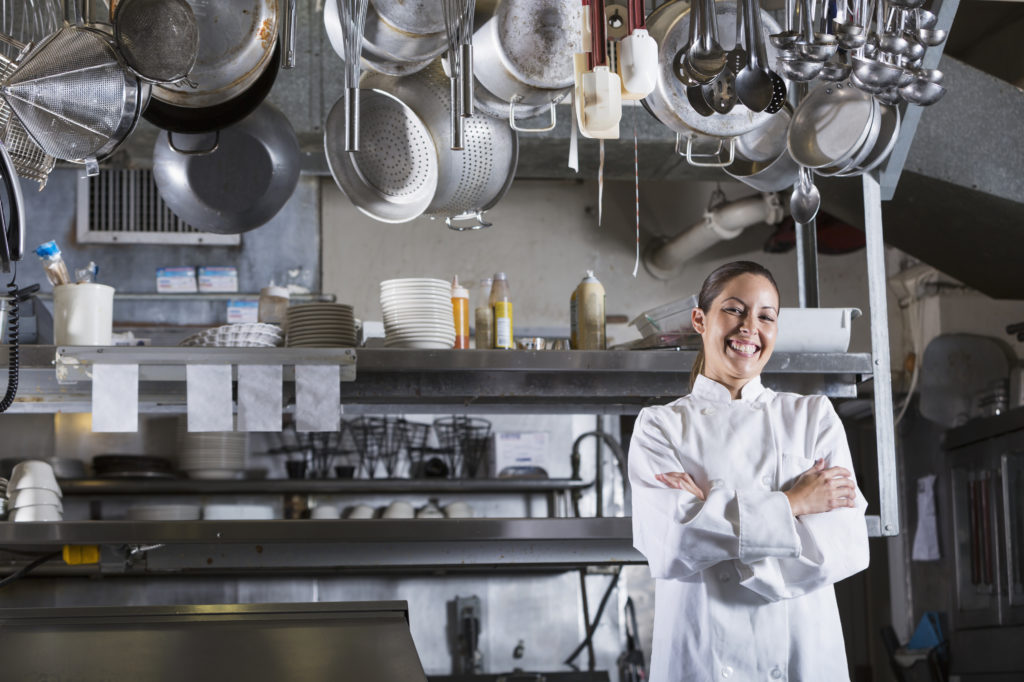how to become a chef
February 22, 2021
This article discusses how long it takes to become a chef. For a complete step-by-step plan to becoming a professional chef, see: How to Become a Chef: The Complete Guide.
If you planned to become a lawyer, your path would be clear. First you'd complete your undergraduate degree, and then you'd apply to a three-year law school. After graduating law school, you'd study for and pass the bar. Then, congratulations! You're a lawyer.
But in the culinary world, the path to becoming a chef isn't so well defined. There's no final exam, no set number of work hours, no one-size-fits-all education that all chefs MUST have. Some cooks earn the title of chef very quickly. For others, it takes more time.
So let's explore how one becomes a chef, what that title means, and how long it may take.
What is a Chef, Exactly?
It may seem obvious, but it's not as simple as it seems!
Some students enter culinary school thinking they'll graduate as full-fledged chefs. But that's not the case. While education is an important component in the designation of chef, it's not all that's required. Chefs must have a combination of education (either through school or learning "on the job"), experience, and rank to earn the title.
"We all hear the word chef everywhere. But nobody can ever say what the definition of a chef is. Everybody thinks that because you're called a chef, there's something more to you. To me, the simple difference between a cook and a chef is that one knows how to cook and another knows how to make money cooking."
Escoffier Chef Instructor Jesper Jonsson
A chef is a supervisor, someone who not only cooks, but may be responsible for creating recipes, managing schedules, pricing the menu, and managing costs. So simply graduating culinary school, while part of the puzzle, is not enough.

A cook must continue to learn and work their way through the ranks of a kitchen before they can be called a chef. That title is taken very seriously in the culinary world. Austin food truck owner Nahika Hillery was uncomfortable being called a chef by the local press, since she didn't have a culinary education. So she attended Auguste Escoffier School of Culinary Arts while running her food truck to earn those credentials and feel more confident in the title of chef.
"Every time I was approached by a food blogger or press, I was referred to as chef. I didn't feel right having that title without the credentials. I was a really good home cook, but I lacked the confidence in my skills in a professional setting. The culinary industry is such a respected field, and I wanted to be on an equal playing ground with other chefs that I had an opportunity to work with."
Nahika Hillery, Escoffier Austin Culinary Arts Graduate & Chef/Owner, Kréyol Korner Caribbean Cuisine
What Does a Chef Need to Know?
The executive chef is the top expert in the kitchen. They know how to do every job — because they probably have, at some point in their career.
They know the menu backwards and forwards, since they probably created the recipes. This means they understand flavor profiles, balance, food pairing, and plating.

They must know how to price and plan a menu for profitability, how to make a schedule that doesn't leave the kitchen over or understaffed, and they need to know all the food safety guidelines and local health codes.
How does a chef become an expert in all these things? There's a lot of learning on the job. But with a culinary school foundation that teaches the basics of these topics and more, students may find that the path to earning that title of chef may be a bit shorter.
"I went from washing dishes and cleaning a commercial kitchen to managing my own within a two-year span. Escoffier has given me the culinary and business tools, resources, knowledge, and self-confidence I need in order to make my dream a reality!"
Mitchell Rodriguez, Escoffier Online Culinary Arts Graduate and Sous Chef, Holiday Retirement
The Timeline for Becoming a Chef
Since there's no one-size-fits-all approach to a culinary career, every path to the role is different. Here is one possible way to become a chef.
Start With a Culinary Arts Degree or Diploma
The best place to start your culinary career is with a degree or diploma from an accredited culinary school.
At Escoffier, you can complete one of our diploma or associate degree programs in just 60 weeks (15 months). That timeline includes your industry externship, where you'll get valuable hands-on experience in a commercial food establishment.
Secure Your First Culinary Job
Either while you're in school or shortly after you graduate, you can secure your first job in a professional kitchen. If you're new to the industry, you'll usually start in an entry-level position. New cooks often start as prep cooks where they chop, weigh, and prepare ingredients for the line cooks to turn into finished dishes.

Escoffier graduates can get help in their job searches throughout their career with lifetime job placement assistance from our Career Services staff. This team offers industry referrals, resume writing and interview assistance, and access to job listings.
Once you have that first job, it's time to work your way up!
Climb the Ladder
For many prep cooks, the next big step is to become a line cook.
Depending on factors like your education, performance, and job availability, you could get your first promotion in a few months, or it could take a year or two. From there, you could be promoted to lead line cook, supervising a station, or managing the line.

Become the Right Hand
On the path to becoming a chef, most culinarians make a stop as a sous chef.
So are you a chef now? While the word "chef" is in the title, and the rest of the staff may respond, "Yes, chef," when you ask them to do something, you're still not really the boss.
"We always say in this profession that you need to grow into the position that you inspire to have. So if you want to become a sous chef, as a lead line cook, you need to begin doing sous chef jobs already."
Escoffier Chef Instructor Jesper Jonsson
The sous chef is the executive chef's right hand. They often make schedules and run the day-to-day affairs of the kitchen. It could take as little as three years to become a sous chef, or as many as seven (or more!)
Become the Executive Chef
Once you've been a sous chef for a few years, how do you take that last step?
Some sous chefs get promoted to executive chef. But that means the existing executive chef has to vacate the role. If your boss is firmly entrenched and doesn't plan to leave anytime soon, you may need to seek out a new kitchen to make the leap from sous chef to executive chef. Or if you're entrepreneurially-minded, you could open your own restaurant, food truck, or ghost restaurant where you're calling the shots.
Whatever path you take in your culinary career, you may find — like many chefs before you — that a culinary education could help you to get a head start and advance your career more quickly.
"Honestly, without [culinary education] I wouldn't be nearly as successful. The knowledge I gained helped me rise quickly as a chef. I may have still started at the bottom rungs of the ladder, but I certainly wouldn't be working where I am now."
Max Feist, Boulder Culinary Arts Graduate
Education is the First Step
With so many variables at play, it's impossible to say how long it will take any one person to earn the chef title.
But one thing is for sure — starting now is the best way to get there. With degree and diploma programs designed to provide a comprehensive education in 15 months or fewer, you can be light years ahead of where you are now in very little time.
And with Financial Aid resources available to many students who qualify, and programs available fully online with in-person externships, it's never been more affordable or more accessible to start working toward becoming a chef.
If you'd like to learn more about culinary education, try these articles next:
- What to Look For in a Good Culinary Arts Curriculum
- From Education to Entrepreneur: Benefits of One-on-One Chef Mentoring
- How to Become a Chef: The Complete Guide
Subscribe to Blog
Related Articles
how to become a chef
Source: https://www.escoffier.edu/blog/value-of-culinary-education/how-long-does-it-take-to-become-a-chef/
Posted by: coopertives1980.blogspot.com

0 Response to "how to become a chef"
Post a Comment